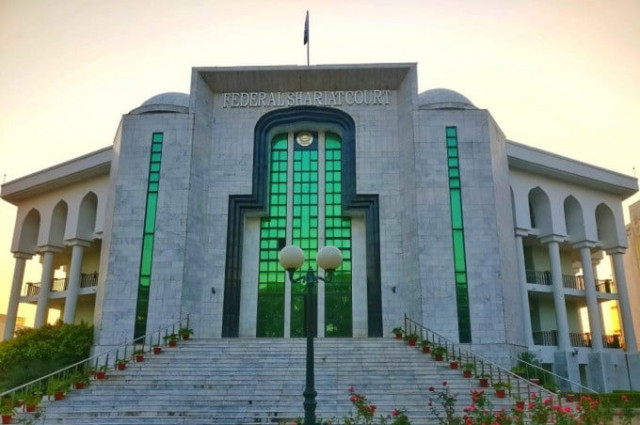FSC gives govt five years to eliminate Riba
Court tells govt to adopt Shariah-compliant modes in future while borrowing either from domestic or foreign sources

After the matter remained pending for 20 years, the Federal Shariat Court (FSC) has finally declared that the prohibition of Riba was absolute in all its forms and manifestations according to the injunctions of Islam and in accordance with the Holy Quran and Sunnah. Therefore, it should be eliminated from the country in five years.
“We are of the view that five years period is reasonably enough time for the implementation of our decision completely i.e convert economy of Pakistan into, equitable, asset based, risk sharing and interest-fee economy,” read a 298-page judgment authored by Justice Dr Syed Muhammad Anwer and endorsed by two other judges.
“Therefore, we would specify the 31st day of December, 2027 on which the decision shall take effect by way of complete elimination of Riba from Pakistan,” it added.
A three-judge bench, led by FSC Chief Justice Muhammad Noor Meskanzai, heard the matter. A senior government functionary had revealed that different banks would move an appeal against the FSC judgment soon.
Finance Minister Miftah Ismail wrote on Twitter that he welcomed the FSC decision in the Riba case.
“The government and SBP [State Bank of Pakistan] will carefully study this important decision and then seek guidance and clarification from the FSC about the process, steps and timeframe to implement this decision,” he added.
Earlier in 1999 while hearing an appeal against the decision, the Supreme Court’s Shariat Appellate Bench upheld the FSC decision and gave the then government two years to amend all the banking laws of the country and other statutes to prohibit Riba.
Later, however, the government and some banks had instituted a review petition before the Supreme Court bench, headed by Chief Justice Sheikh Riaz, against the anti-Riba ruling.
The bench remanded the case in 2002 back to the FSC to reconsider the matter.
Now the FSC while giving its final judgment observed that the prohibition of Riba was the cornerstone of the Islamic economic system.
“Therefore, we have decided that every loan which extracts any additional amount upon the principal from the debtor is Riba, hence, any transaction that contains Riba even at a slightest level, falls within the category of Riba thus prohibited. Furthermore, all the prevailing forms of interest, either in the banking transactions or in private transactions fall within the definition of Riba.”
The FSC also held that any interest stipulated in the government borrowings acquired from domestic or foreign sources was Riba and clearly prohibited by the Holy Quran and Sunnah. “Therefore, the government is directed to adopt Shariah-compliant modes in the future while borrowing either from domestic or from foreign sources.”
The FSC noted that it would like to refer to the constructive, encouraging and positive approach of the international financial institutions including the International Monetary Fund (IMF), Asian Development Bank and World Bank to utilise Shariah-compliant, Riba-free financing modes for that were more productive and economically feasible.
“Additionally, another fact is also relevant here that according to some submissions before us, the Peoples‘ Republic of China is also willing to utilise the Islamic mode of financing for the CPEC projects, needless to mention that we are already utilising Riba-free Shariah-compliant mode of financing while dealing with the Islamic Development Bank and with some of the Islamic countries.”
The court also noted that the speedy proliferation and exponential growth of interest-free banking not only in Pakistan but in the whole Islamic world and even worldwide was a reality.
“This has established that interest-free banking system is not only practicable but feasible too. With this backdrop based on facts, we do not agree with the apprehensions shown by the federal government that [the] introduction of Interest-free banking … may have a negative impact on the overall economic system of Pakistan.”
The court also noted that legal and statutory framework backed by the SBP for embracing the interest-free banking in Pakistan was already available, in furtherance of which the existence of Section 25 (2) (b) of the Banking Companies Ordinance, 1962 and Section 22 of the State Bank of Pakistan Act 1956 paved the way for complete elimination of Riba from the economy.
“One of the basic goals of an Islamic state like Pakistan is to have an equitable economic system free from exploitations and speculations. The Islamic economic system is an equitable, asset based and risk sharing economic system. It promotes and encourages the circulation of money in a society.”
The court noted the Islamic system sternly discouraged the accumulation of wealth in a few hands. Islamic economic and finance system is based on real economic activities which prohibits Riba.
Read Govt taking steps towards Islamisation of economy, FSC told
“We are of considered view that all those laws or the provisions of laws, which are under challenge before us, which contain the word ‘interest‘ within the meaning of banking interest is Riba, hence prohibited and any payment of extra amount in addition to due payment due to a delay, which is considered and calculated as interest over that amount also falls within the category of Riba, hence prohibited being repugnant to the injunctions of Islam according to the principles as laid down in the Quran and Sunnah. All the prevailing forms of interest either in the banking transactions or in private transactions do fall within the definition of Riba. Therefore the government is directed to delete the word ‘interest‘ wherever it is used in the impugned provisions of law in this sense as already decided by us after examination of each impugned law.”
The FSC noted that the federal government as well as the provincial governments were directed to complete the necessary legislative amendments in the impugned laws in order to bring such laws or provisions of the laws into conformity with the injunctions of Islam by December 31 2027. “Although it is the universal principle of law that it does become effective retrospectively but to avoid any possible ambiguity we categorically made it clear that all such laws will take effect prospectively,” it added.
The order read that the federal government would comply with the mandatory constitutional requirement of Article 29 (3) regarding the submission of annual report before the National Assembly and the Senate on the observance and implementation of the Principles of Policy specifically as stated in Article 38 (f) of the Constitution of Pakistan 1973, regarding complete elimination of Riba within the above stipulated period.
“This is an inbuilt Constitutional mechanism to ensure the observance and implementation of the Principles of Policy which empowers parliament to keep an eye on the working of any government, had that constitutional duty been observed and complied with, many things in our polity would have been different, and Riba would have been eliminated from Pakistan much earlier in compliance of Article 38(f) of the Constitution. Hence, Article 29(3) of the Constitution shows us the constitutional way to ensure the achievement of the target of complete elimination of Riba from the country in a gradual and steady manner, therefore, we rely on the same Article 29(3) of the Constitution to ensure the complete implementation of our judgment.”
Legal expert Avocate Hafiz Ahsaan Ahmad Khokhar commenting on the issuance of Riba judgment that the FSC was a constitutional court, established under Article 203 in 1980, and had the extraordinary power and jurisdiction to examine and decide the questions whether or not any law or provision of law was repugnant to the injunctions of Islam, as laid down in the Holy Quran and the Sunnah of the Holy Prophet (PBUH).
He added that the FSC had the valid constitutional mandate to declare in the present judgment that prohibition of Riba was a cornerstone of the Islamic economic system and that all the provisions of the Interest Act 1839, which facilitated interest were unlawful, and consequently the prevailing interest-based banking system in Pakistan was against Shariah.
He also said the directions given by the FSC to the government through the present landmark judgment was binding in nature.
“Thus, the federal government and all relevant departments are legally obliged to implement the judgment in letter and spirit, and to take immediate steps now with coordination of all stakeholders with way clear cut forward strategy that all loans category must work under an interest-free system in Pakistan.”
The senior lawyer further said that this was the second judgment of the FSC on the subject of Riba.
“More importantly, the present judgment of the FSC has been announced in pursuance of a remand order of the Supreme Court and has addressed all points referred to in the judgment, thus there would be very limited chance of success for the federal government to succeed if filing an appeal again in Supreme Court, when particularly, the present judgment of the FSC in addition to above has also given very reasonable the grace period to federal government and relevant departments till December 2027 for the implementation of the judgment.”
He recalled that the earlier FSC had declared the laws allowing interest repugnant to Islam in 1991 and gave the time of implementation by June 30, 1992.
“The full judgment of the court consisted of about 1,100 pages. The federal government and certain banks had filed 67 appeals against this judgment in the Shariah Appellate Bench of the Supreme Court.”
The legal expert said that later on, the Riba case was remanded back by the Supreme Court to the FSC for determining the issue afresh based on certain few points relating to jurisdiction of the FSC and hurdles in practical Implications of the judgment as raised by federal government's observations related to definition and interpretations of Riba. They included distinguishing legal and moral aspects of Riba, inflation, and indexation of modern time, and errors floating on the surface of record in the judgment dated of December 1999.



















COMMENTS
Comments are moderated and generally will be posted if they are on-topic and not abusive.
For more information, please see our Comments FAQ